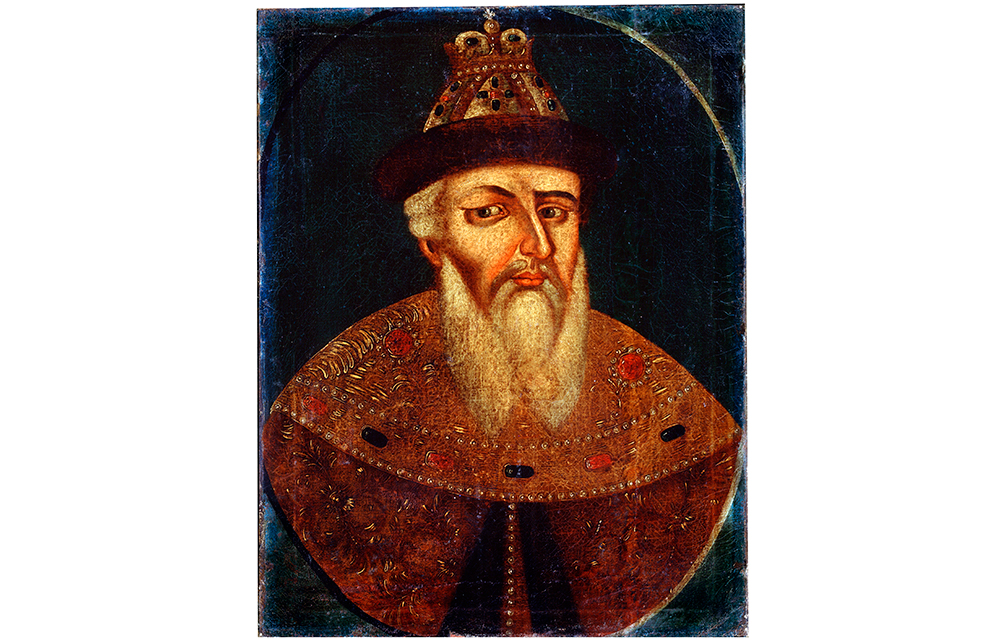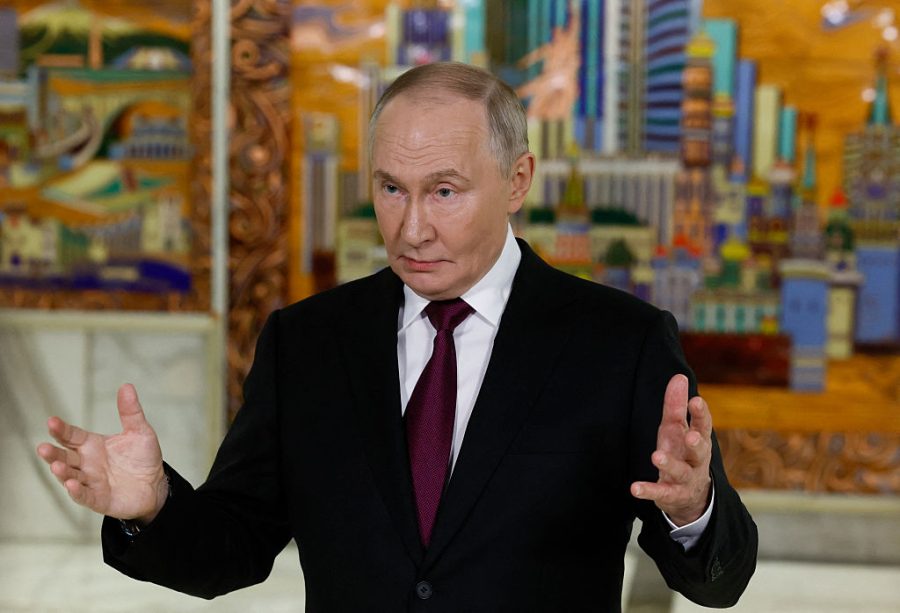Has a book ever been more bizarrely mis-titled than this one? The First Cold War: Anglo-Russian Relations in the 19th Century has nothing whatever to do with the actual Cold War, nor is it for the most part concerned with the 19th century. Rather, Barbara Emerson has written a thorough and often diverting diplomatic history of Anglo-Russian relations from the 16th to the early 20th century. This period encompasses at least 14 wars in which British and Russian troops found themselves embroiled, sometimes on the same side, sometimes on opposite sides. None of these wars was remotely ‘cold’. Nor does Emerson attempt to make any argument that the shifting great power politics of the 19th century resembled those of the post-second-world-war nuclear age.
‘To drinke drunke is an ordinary matter with Russians every day in the weeke’
The book begins in a period when both the Russians of Muscovy and the English were marginal powers on the fringes of Europe. ‘Muscovy and its culture were very different from any other with which Tudor England was acquainted,’ observes Emerson, forgetting the Virginia Colony and Francis Drake’s exploration of California. Mary I and her consort, King Philip of Spain, declared themselves officially the ‘discoverers’ of Muscovy (which would have come as news to Poles, Prussians and Swedes) and granted a charter in 1555 to the Muscovy Company – the first English joint-stock trading company. An embassy from Ivan the Terrible followed the next year, but the ambassador, Osip Nepeia, alienated Londoners with his extreme suspicion. ‘He thinks that every man will beguile him,’ one merchant complained. ‘As the Russians do not always speak the truth themselves, they think that other people are like them.’
Subsequent return embassies also yielded a rich crop of zinging observations of Russian customs that launched a thousand clichés still alive today. ‘They are great talkers and liars, flatterers and dissemblers,’ reported the explorer Anthony Jenkinson of the Muscovites in 1556. ‘I heard of men and women who drank away their children and their goods in the Emperor’s taverns.’ Giles Fletcher, who led an embassy to Moscow in 1588, observed that ‘the state and forme of their government is plaine tyranicall, as applying all to the behoofe of the prince’, and complained that ‘after dinner there is no talking with them. To drinke drunke is an ordinary matter with them every day in the weeke.’ Samuel Collins, Tsar Alexei Mikhailovich’s physician, observed in 1671 that Russians were ‘wholly devoted to their own ignorance’. They ‘love nothing soft or smooth but their women’s fat sides’, and could be compared to a flock of owls, ‘more in love with their own twilight, than with our noon-day, because the eyesight of their understanding is dazzled with the bright beams of truth’.
Emerson dispels the myth that Ivan the Terrible asked Elizabeth I’s hand in marriage (though he did ask for political asylum in case he lost his war with the Poles, as well as for an English eighth wife). But it is a pity she overlooks the poet Andrew Marvell’s participation in the Earl of Carlisle’s embassy to Moscow in 1663. (What a great Rose Tremain novel that would make.)
Peter the Great’s outrages while staying with John Evelyn in Deptford are covered. The young Tsar and his entourage used Evelyn’s portraits as target practice and destroyed his hedges by running each other through them in wheelbarrows, necessitating extensive repairs supervised by Christopher Wren. William III staged mock sea battles in the Solent for Peter, who reputedly said he would rather be an English admiral than tsar of Russia. ‘After I had seen him often and had conversed much with him,’ wrote Bishop Burnet, ‘I could not but adore the depth of the providence of God that had raised up such a furious man to so absolute an authority over such a great part of the world.’
It comes as a surprise to learn that Peter would later offer the Duke of Marlborough, fresh from his victories at Blenheim and Ramillies, the pick of titles to the principalities of Kiev, Vladimir and Siberia, a pension for life and one of the largest rubies in Europe if he would only agree to mediate a peace with Sweden. Marlborough’s view was that it was better to let the king of Sweden turn his armies on the tsar than cause trouble for the Allies in the War of the Spanish Succession. And who knew that Catherine the Great turned down George III’s request for 20,000 Russian troops for service in suppressing the American colonists?
The behaviour of Russians in England, from students to ambassadors, provides some wry counterpoints to modern times. The first set of Russian students sent to Oxford and Cambridge never returned home; nor did the second. Prince Ivan Chernyshev, appointed Ambassador to the Court of St James’s in 1767, caused unseemly scenes in the pursuit of his empress’s instruction to yield precedence to no other power. His wife arrived with £40,000-worth of jewellery, as well as a vast amount of silver and other impedimenta that called for 43 horses to transport and a special dispensation from the British Customs. London society was awestruck by the Prince’s finery and display, ‘beyond that of any publick minister that has ever been here’. The Chernyshevs, like their later spiritual heirs the oligarchs, were also famous for their enormous shopping sprees.
When British bien-pensant opinion condemned Russian pogroms against the Jews in January 1882, the St Petersburg newspaper Novoe Vremya came back with a classic ‘what-aboutist’ rebuttal worthy of Russia Today:
The concern of England, which has beggared the population of India and Egypt, which has poisoned the people of China with opium, which has destroyed, like dangerous insects, the natives of Australia, and which, under pretext of abolishing the slave trade, is now exterminating in most wholesale fashion the numerous races of Africa – the concern of a people who do those things is certainly astonishing.
It is in the 19th century (the self-declared subject of this book) that the author hits her richest vein of Anglo-Russian interaction, but also wanders deepest into irrelevance. During the preceding centuries, relations between the two countries were relatively narrow and easy to follow. But from the Napoleonic Wars onwards, the scope of both Russian and British power and diplomacy grew so great in geographic and political scope that Emerson finds herself slaloming through ever widening tracks to cover it all. Tangentially, the Concert of Europe, the Balkan Question, the Scramble for Africa, the Great Game, the Anglo-Iranian Oil Company, the collapse of the Chinese empire and the Japanese occupation of Korea all concerned, in some degree, both Britain and Russia. But when Emerson attempts to make this account also a potted history of Russia’s internal politics, the task becomes unmanageable.
‘The English, under the pretext of abolishing the slave trade, are now exterminating the races of Africa’
She is on surer ground where Russian and British lives touch closely. Russian exiles in Britain – from Alexander Herzen in the 1840s to the socialists who congregated in the British Library in the 1880s – directly affected the politics of their homeland. Prominent visitors – including Tolstoy, whose tours of London schools and hospitals are mentioned briefly but not covered in detail – made a huge impression and had a significant influence. Also, the dynastic and personal relationships of the British and Russian royal families were highly relevant to the greater diplomatic story. It may surprise some to learn that Tsar Alexander I visited England in 1814, and in 1839 the 20-year-old Queen Victoria professed herself ‘quite in love’ with his son and eventual successor, the Grand Duke Alexander – who taught Victoria a new dance, the mazurka, at a ball at Windsor Castle.
There is some muddle over Russian place names. ‘Azoph’, in a quote, is corrected to ‘Azoz’ – a non-existent place of which Prince Potemkin was apparently the governor-general. (Emerson means Azov, on the Black Sea.) Prince Dmitri Kropotkin is described as the governor of ‘Charkov’ (Kharkov in Russian or Kharkiv in Ukrainian). Strangest of all is the author’s decision to end the book with a chapter on the Anglo-Persian Oil Company, thereby withdrawing from the narrative at the very moment when all the international tensions she has so painstakingly described are about to come to a fateful head. We learn nothing about the Russian role in the Balkan wars; the ensuing first world war; the thwarted rescue of the Romanovs; or the failed British attempt to strangle Bolshevism in its cradle.
As Sir Rodric Braithwaite, the last British ambassador to the Soviet Union and the first to Russia, writes in his introduction:
There has always been something odd about the relationship between Britain and Russia… Both sides are convinced that the other continually interferes in its internal affairs. They admire one another’s high culture, but that does little to mitigate the underlying hostility.
Emerson’s publishers should have abandoned their dim-bulb marketing trick of linking this book with the Cold War. They should have called it Best of Enemies instead.








Comments